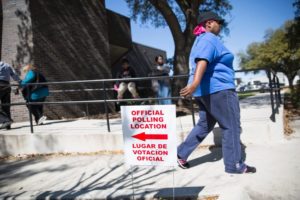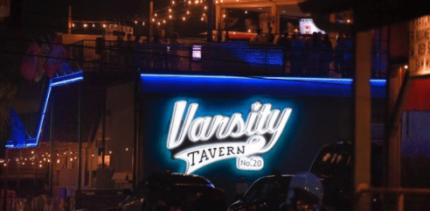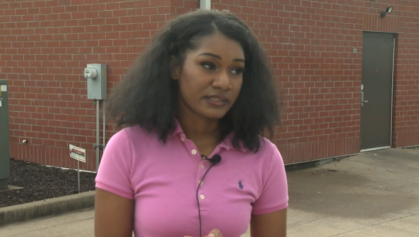
In 2014,a lower court found that more than 600,000 Texans, many of whom are Black and Latino, didn’t have the proper forms of ID to vote. (Photo by Laura Buckman/AFP/Getty Images)
For the second time, a federal judge on Monday, April 10, ruled that Texas’ voter ID law was filed with intent to discriminate against Black and Latino voters.
The U.S. 5th Circuit Court of Appeals ruled last year that the law openly discriminated against Blacks and other minorities but stopped short of determining whether it was intended to be discriminatory. The case was then kicked down to a district court to reconsider the issue, The Dallas Morning News reported. On Monday, U.S. District Court Judge Nelva Gonzalez Ramos ruled that the law was, in fact, intentionally discriminatory.
In her opinion, Ramos wrote that plaintiffs had successfully proved that “a discriminatory intent was at least one of the substantial or motivating factors” that influenced the passage of the contested law, adding that it was up to the state to prove the measure would have passed without its discriminatory purpose.
“The State has not met its burden,” the judge wrote. “Therefore, this Court holds, again, that SB 14 was passed with a discriminatory purpose.”
Ramos went on to write that the state had failed to find ways to accommodate potential voters who had trouble getting their hands on the necessary forms of ID. She said the legislature declined changes to make the law less discriminatory, like permitting “additional types of photo identification, a more liberal policy on expired documents, easier voter registration procedures, reduced costs for obtaining necessary ID and more voter education regarding the requirements.”
The state’s voter ID law is considered to be one of the strictest in the nation. Residents are required to show one of seven state-approved forms of identification in order to vote, which include a valid driver’s license, passport, concealed-handgun license or a military ID card. In 2014, a lower court found that over 600,000 Texans, many of whom are Black and Latino, did not have the proper forms of ID required to vote in the Lone Star state.
Plaintiffs in the case, as well as Democratic leaders and voting rights advocates praised Monday’s ruling.
“Today’s ruling is a crucial step in the six-year journey toward justice for Texas voters since this restrictive voter ID law was passed,” Danielle Lang, deputy director of voting rights at the Campaign Legal Center, which represented disenfranchised voters in the case, said in a statement.
“Judge Ramos was absolutely correct in her judgment that this law was designed to harm minority voters and cannot stand,” Lang added. “SB 14 was expertly crafted to harm minority voters in order to minimize their voice just as their political power was growing. Legislators must respond to their electorate, not silence their voters.”
Texas Democratic Party chairman Gilberto Hinojosa echoed Lang’s sentiments, arguing that Texas Republicans had intentionally crafted their voter ID law to “attack the sacred voting rights of Texans.”
“It is disgusting and shameful that Republicans have worked so hard to keep Texas’ diverse new majority away from the polls,” Hinojosa told The Dallas Morning News. “Sadly, the damage has been done. For the past several years, Texas Republicans stripped over 600,000 Texans of their right to vote through the discriminatory voter ID law.”
While the ruling likely won’t have an immediate impact, it’s still significant, as Texas risks losing its right to independently change its election laws without federal approval, according to Fox News.
Republican Texas Attorney General Ken Paxton hasn’t yet issued a statement on the ruling, but one of his top deputies hinted at the possibility of appealing the case yet again.
“It’s possible,” said Brantley Starr, a deputy first assistant attorney general. “It’s our belief that you’d have to have multiple instances of discriminatory purpose.”
According to The New York Times, Monday’s ruling marked the third instance this year where a federal court determined, in separate cases, that Texas and/or one of its municipalities had intentionally discriminated against Black and Latinos.
“The state of Texas must turn away from this pattern of discriminatory behavior,” Janai Nelson, a lawyer with the NAACP Legal Defense Fund who represented an African-American voter affected by the state’s voter ID law, told the newspaper.


